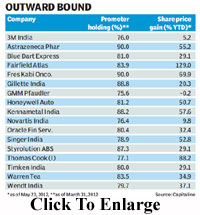Attractive valuations and sliding stock prices in a bearish market are pushing several overseas firms to delist their listed entities in India. In the past two months, Patni Computer Systems, Carol Info Services, Exedy India and UTV Software Communication and Alfa Laval (India) have successfully delisted from Indian bourses. Thomas Cook Group and German firm Styrolution are reportedly planning to delist their subsidiaries Thomas Cook India and Styrolution ABS (India), respectively.
 According to a report by ICICIdirect.com, 18 MNCs may be looking to delist their shares. These include Oracle Financial Services, Novartis India, Honeywell Auto, Gillette, Blue Dart and 3M India. This comes in the wake of guidelines mandating private sector listed corporates to up their minimum public shareholding to at least 25% by June 2013.
According to a report by ICICIdirect.com, 18 MNCs may be looking to delist their shares. These include Oracle Financial Services, Novartis India, Honeywell Auto, Gillette, Blue Dart and 3M India. This comes in the wake of guidelines mandating private sector listed corporates to up their minimum public shareholding to at least 25% by June 2013.
?Right now, the valuations are attractive and the promoters will have to pay less for buying shares from the public. In this bearish market, investors would be more willing to sell their shares even at marginal premium. So, right now, delisting is a good option for cash-rich firms that do not want to dilute their stake further,? said Bharat Chhoda, AVP, research, ICICI Securities. He added delisting would improve operational efficiencies as it does away with the need for regulatory approvals, quarterly updates and other listing requirements.
Typically, plans of a delisting announcement lead to a rally in the stock of the firms. For instance, shares of Patni Computer Systems rallied from R380 per share prior to the delisting announcement to about R500 per share when iGate Corporate accepted the discovery price for delisting the stock. ?Our studies have shown delisting typically happens at a 30-40% premium to the current market price of the firm. So, after a delisting is announced, investors buy into the stock on hopes that the stock price will spurt,? said an investment banker of a large financial services firm.
Till the last few months, only a handful of companies had managed to delist. Delisting is not easy as the company must get approval of 2/3rd of the shareholders through postal ballet, establish an acceptable price through reverse book-building and increase the holding to the required threshold.
